News
How FG turned Nigerians into beggars through palliatives — Afe Babalola
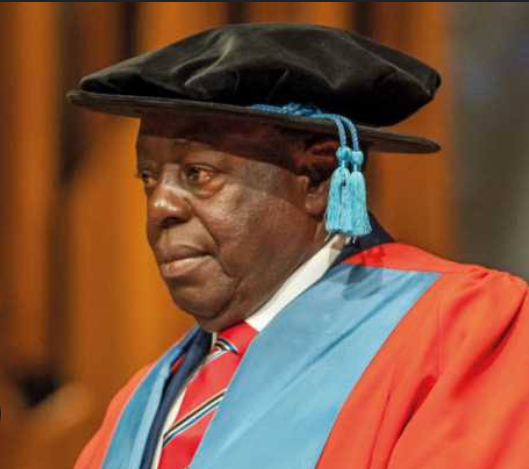
By Kayode Sanni-Arewa
The founder of Afe Babalola University Ado-Ekiti, ABUAD, Aare Afe Babalola, yesterday, took a swipe at the Federal Government over the distribution of palliatives, describing it as an attempt to turn Nigerians to beggars and leading them to poverty.
He also threw his weight behind the Patriots’ call for a new constitution.
Babalola made this known when the Prestige Sisters League came on a thank-you visit to him at the ABUAD campus.
Speaking on the recent protest across the country, he said that those protesting against hunger do so because everyone knows there is hunger in the country.
He said: “Those who are complaining about hunger are doing so sincerely. They are hungry. A hungry man can go to any length to show his anger. We do not need anybody to tell us about hunger in the country. The protest was genuine and the government should listen to them.
“The duty of government is the welfare of the people. The problem we have now is that people cannot move freely. They have abandoned the farms. People are being killed in their farms and everybody wants to stay where they are safe. It is because the government has failed in this regard that we have hunger.
“It is wrong for the government to be sharing garri, beans and rice as palliatives. They are turning the people into beggars. The government that is giving the people rice and beans is leading us to poverty. The government is discouraging people from working, whereas, the government must provide the people enabling environment for people to work and feed themselves.”
On the Patriots’ call for a new constitution, he said Nigeria does not have to go through any constitutional conference but the parliament should reenact the 1963 constitution.
Babalola said: “I read the publication of the Patriots visiting President Tinubu and I am in full agreement with them. We need a new constitution. But I do not agree that we should go through any constitutional conference.
“Recently, you are aware that President Bola Tinubu asked us to go back to the old National Anthem; there was no conference for it before it was passed by the National Assembly and assented by the President. The 1963 constitution was the one made by all of us. By the same token, the parliament should bring back the 1963 and reenact it.”
News
Oborevwori absent as Delta APC leaders meet with Uzodinma in Abuja
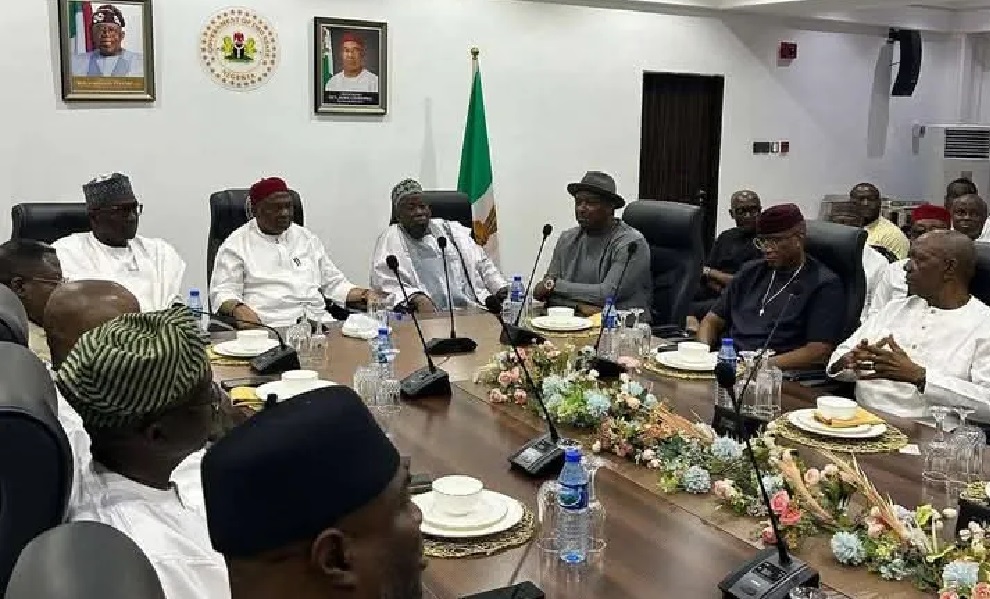
Delta State Governor Sheriff Oborevwori was absent when the Progressive Governors’ Forum (PGF) met in Abuja on Saturday night.
The meeting was to welcome new entrants into the ruling All Progressives Congress (APC), but Oborevwori, who recently teamed up with the party, did not attend.
Oborevwori, who swept to victory in 2023 under the main opposition Peoples Democratic Party (PDP), however, dumped the party earlier in the week, citing several factors.
The governor, his predecessor, Ifeanyi Okowa, and the entire PDP in the South-South state said they are collapsing their structure in the leading APC, which they argue serves as a better platform for the oil-rich state.
Other persons who attended the meeting include Senator Ned Nwoko, who represents Delta North; the Minister of Aviation, Festus Keyamo; a former Deputy Senate President, Ovie Omo-Agege; APC scribe, Felix Morka; a former governorship candidate in Delta State, Great Ogboru, and other members of the National Assembly.
Saturday’s meeting was held at the Imo Governors’ Lodge in the nation’s capital.
The recent wave of defections from the PDP to the APC has stirred debates among observers, politicians, and Nigerians alike.
With Okowa, a ranking member of the PDP who was the party’s vice presidential candidate in the 2023 election, joining APC, analysts argue that the most recent defections are a big blow to the main opposition party’s move to retake power in 2027.
But some PDP chieftains, including Bode George, former Senate President Bukola Saraki, and ex-Vice President Atiku Abubakar, are unmoved by the development.
They say the party would bounce back stronger ahead of the next general elections.
“What impact has the APC, as a government, given to the people? There is anger in the land. What do you think they are going to do there, if not for personal embellishment?” George, a former Ondo State military governor, said on Friday’s edition of Channels Television’s Politics Today.
“The people of Delta are naturally PDP members. They know the kind of positive impact they enjoyed under the PDP national government. So, if you now decide to go, we wish you the best of luck. We’ve seen it before—those who trooped out eventually came back, because they’re heading into an organisation that is so personally owned.
CREDIT: Channels Television
News
Enugu Airport to reopen Monday — FG
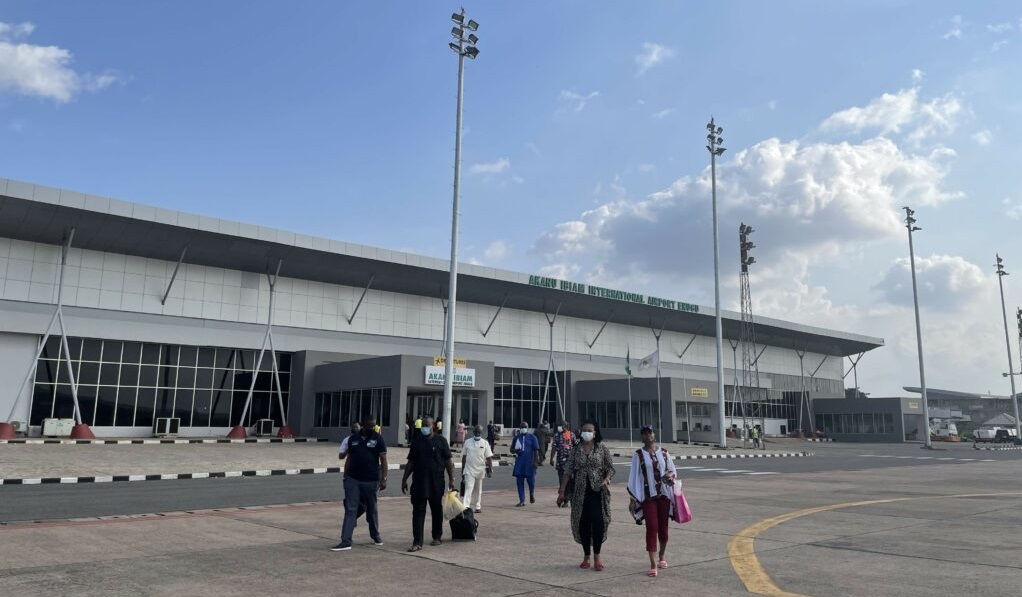
The Federal Government of Nigeria has announced that Akanu Ibiam International Airport in Enugu, Enugu State, will reopen for flight operations on Monday, 28th April 2025, following the completion of emergency runway repairs.
On April 18th, 2025, the Federal Airports Authority of Nigeria (FAAN) announced that, due to a sudden and significant rupture in the asphalt surface at a critical section of the runway, the runway would be shut down for emergency repairs.
According to a statement by Mrs. Obiageli Orah, Director of Public Affairs and Consumer Protection, work was scheduled to begin on April 22nd and conclude before reopening on May 6th, 2025. However, rehabilitation works on the runway have been completed earlier than anticipated, and the runway has been cleared for landings and takeoffs by the engineers working with FAAN.
“FAAN appreciates all airport users and stakeholders for their understanding and cooperation during this time. The Authority sincerely apologises for the inconvenience but assures the public that all actions were taken in the interest of safety,” the statement read.
News
COVID-19 Vaccine Killed Pope Francis, says Pastor Oyakhilome
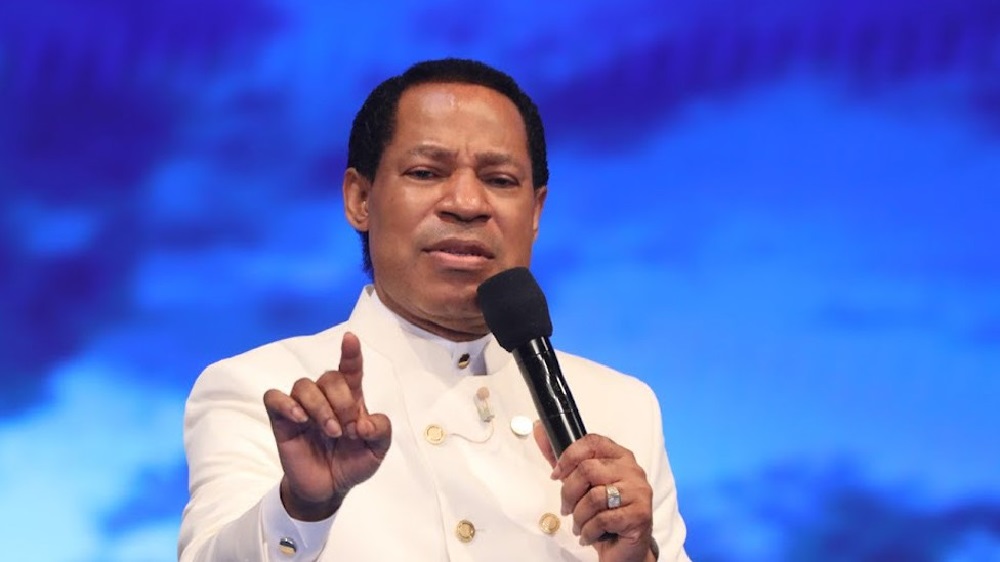
Pastor Chris Oyakhilome of LoveWorld Incorporated has claimed — without proof — that the COVID-19 vaccine was responsible for the death of Pope Francis.
In a video of a programme held on Thursday, which has since gone viral on YouTube, Oyakhilome alleged that the late Pope had aligned himself with “globalists” by promoting COVID-19 vaccines, a decision he said ultimately led to his death.
“I pointed it out during your LoveWorld Specials,” Oyakhilome said.
“While he was trying to encourage the world to take the vaccines, he stated that if Jesus were here, he would have taken the vaccine, and I found that very insulting.”
The televangelist went further to claim that the Pope’s stroke, reported as the immediate cause of death, was a result of blood clots triggered by the vaccine. Speaking to his congregation, Oyakhilome asked a medical doctor present whether a blood clot could cause a stroke. After receiving an affirmative response, he asserted: “The vaccine killed the Pope.”
“Blood clots is one of the most common causes of death from the vaccine. He’s not the only one. Many of them who became ill will not tell you. No one is going to tell you he died as a result of the vaccine. I warned you. I warned the world about taking those mRNA vaccines. No vaccine is good, not one of them, and they have never worked; it’s always been a deception,” said Oyakhilome.
“They have these people dying, they won’t tell you the cause. They dress it up. They get sick and they can’t be cured. They get sick and sick and worse and worse until it kills them. For some, very quickly. They call it sudden death syndrome. So, just remember that I warned you.
“This was a very healthy pope, and I told you that once that substance is inside your body, it can’t leave, it doesn’t go away. They have no scientific way to remove it because they never planned to remove it. It was planned for death, to kill as many people around the world. I feel pained that a pope like that would have his life cut short. And many around the world may not know what led to it but I have told you what led to it. It was the vaccine.”
This is not the first time Pastor Oyakhilome has made unsubstantiated claims about vaccines. Since 2020, he has consistently propagated misinformation about COVID-19 vaccines, despite overwhelming scientific evidence proving their safety and effectiveness.
MEDICAL FACTS AND OFFICIAL STATEMENTS
Contrary to Oyakhilome’s assertions, official information from the Vatican states that Pope Francis was admitted to the Agostino Gemelli Polyclinic Hospital after battling bronchitis for several days. His health deteriorated with a diagnosis of bilateral pneumonia on February 18.
After 38 days of hospital care, the Pope returned to his Vatican residence at Casa Santa Marta, where he died following a stroke and subsequent irreversible cardiac arrest.
The Vatican, in a statement released Monday, confirmed that Pope Francis died of a cerebral stroke and heart failure.
It is also publicly known that in his youth, Pope Francis underwent surgery to remove part of a lung damaged by a severe respiratory infection, a factor that contributed to his declining health in later years.
In 2021, he was hospitalised for 10 days after intestinal surgery. He was again hospitalised in 2023 for bronchitis treatment and later for abdominal surgery to remove scar tissue and repair a hernia.
OYAKHILOME’S HISTORY OF FALSE CLAIMS
Since the onset of the COVID-19 pandemic, Oyakhilome has repeatedly made unsubstantiated claims. In 2020, he alleged that the COVID-19 lockdown in Nigeria was orchestrated to install 5G technology in Abuja and Lagos.
“The Federal Government was pushed to lockdown Abuja and Lagos specifically because of 5G,” he said.
“What killed people in Wuhan, China, was not the virus but the 5G.”
Oyakhilome also dismissed the use of face masks to prevent the spread of COVID-19, claiming it was political rather than scientific. He said, “Wearing [masks] is politics, it’s okay. But no one should lie to us [that] it’s science… In fact, scientifically, it’s dangerous to health.”
-

 News19 hours ago
News19 hours agoList of World Leaders that are present in the final funeral of Pope Francis
-

 News15 hours ago
News15 hours agoJust in: Gunmen invade pro-Wike group in Bayelsa
-

 News23 hours ago
News23 hours agoDefections: Teejay Yusuf traces genesis of PDP palaver, key issues affecting Nigeria’s largest opposition party
-

 News24 hours ago
News24 hours agoCBEX: EFCC declares four persons wanted over crypto fraud + photos
-

 News19 hours ago
News19 hours ago2Face estranged wife, Annie Macauley breaks silence after he married Natasha
-

 News24 hours ago
News24 hours agoScandal! Osun monarch, pastor admit to COVID-19 fraud in US
-
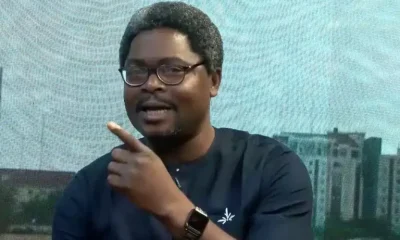
 Politics22 hours ago
Politics22 hours agoUgochinyere remains Nigeria’s number one Hushpuppi of politics-Olayinka carpets Imo Rep
-

 Entertainment19 hours ago
Entertainment19 hours agoMohbad’s Inquest: Pathologist reveals major findings following 2nd autopsy





